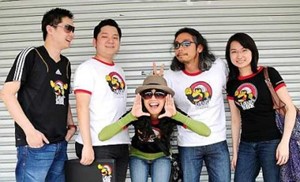By Shahanaaz Habib | The Star

The LoyarBurok group is trying to mainstream human rights in bite-sized pieces to make it hip and fun. But will the urban youth bite?
Do lawyers have a sense of humour? “Oh hell yes! The issues may be serious but we are a fun bunch,” says lawyer Fahri Azzat, who is also a LoyarBurok.
The term LoyarBurok is hardly flattering as it usually refers to someone who talks a lot but doesn’t know much, or a non-lawyer who dishes out his two sen’s worth of (usually unsolicited) “legal” advice.
So which individual or lawyer in his right mind would form a group and call it LoyarBurok?
But that is exactly what happened.
A gang of six lawyers with a hard-to-miss sense of humour got together and set up a tongue-in-cheek law blog (blawg) in 2006 – and named it loyarburok.com
The blog is bold, funny, and at times even irreverent. But what do you expect of a group whose logo is a monkey in a judge’s ceremonial white wig and sticking out its tongue?
Their inspiration, they say, comes from Lord Bobo, a fictitious monkey-like-creature which is an “omnipresent supernatural being that lives in cyberspace and inspires us to do whatever we do.”
Fahri, who is one of the six, says they started the blog as both an advocacy point on human rights issues and a focal point for legal opinion.
“If you go in and read the stuff, it may be funny and a bit tongue-in-cheek but it’s serious stuff and makes sense. Look at the writers we have. We got (an exclusive interview with) (Judge) N. H. Chan and he’s not a nobody.
“We have academics writing for us as well. We have a wide readership. We know some judges do follow the blog because of some critical comments on certain cases.
“I suppose it can be considered contempt of court but we do it like the law journals do. It’s legal criticism where we criticise certain decisions.
“We don’t make personal attacks or say ‘you are stupid’ etc but we say things like ‘in your decision, you didn’t consider this principle or that case’. It is analytical, accurate and serious.
“But we’ve got a monkey on top (as the logo), so that you don’t take it all too seriously,” he says.
Fahri adds that naming the blog LoyarBurok was a way to reclaim and re-shape the word.
Initially, traffic to the blog was slow.
Then came the 2008 elections, and with it the Perak crisis.
As Pakatan Rakyat and Barisan Nasional fought the hard and long battle for control of the state – law suit after law suit – there was a lot of interest in legal opinions on the issue.
And LoyarBurok, which was discussing all this, started getting a lot of hits. In 2010, it received more hits than it had been getting in its first three years.
Buoyed by the interest, LoyarBurok compiled and published these articles recently in a book titled Perak: A State of Crisis. This is their inaugural publication.
These days, the blog gets about 20,000 unique hits every week.
Platform for young writers
Another member of the gang of six, Edmund Bon, says one of the ideas behind the blog is to give a platform for young writers to express themselves.
“They have the energy, (and) want to write but they don’t have a platform so we encourage them. We have about 200 writers now.
“These are people writing for the first time and that is something that is unique.
“If you have the same people writing everywhere – in the mainstream media and blogs – you get the same voice. We want different writers and different voices.
“It’s very DIY (do-it-yourself). Nobody is paid. Everybody has access to the blog. Each writer has a username and password and can upload their article on the blog, which is then edited and released,” he says.
Bon denies that the blog is pro-opposition, saying they had invited pro-government pro-Barisan Nasional people to write. But there have been no takers probably because those people already have easy access to the mainstream media, he says.
He is also quick to point out that the blog operates by international human rights standards, censoring only articles that advocate hatred and violence – which means almost all articles are allowed.
So there are young voices like chambering student Azira Aziz who is writing on testy issues like conversion, apostasy and Islam, and sex education and condoms through her Connecting the Dots column.
“It’s about pushing the boundaries bit by bit and inching forward,” she says.
K. Shanmuga, who focuses on freedom of religion, says five years ago, a young person like Azira would have had no place to write her views and express herself.
“She would perhaps have been too scared but now we have this (LoyarBurok) e-group and a lot of vigorous debate goes on there.
“Perhaps because it is the web, there is less tension and people feel freer to write,” says Shanmuga who is also one of LoyarBurok’s gang of six.
Although LoyarBurok is set up by lawyers, the group insists it is by no means confined to lawyers.
Among their ranks, there are environmentalists, tax consultants, bankers and even someone who sells tyres!
And the group has Twitter and Facebook to thank for bringing them together.
“We have lively discussions and there is camaraderie. We sometimes hang out together and at times we play futsal together,” says Fahri.
With the blog running successfully and its publishing arm in place, LoyarBurok now seems ready to push itself to the next level.
Bon says the blog has metamorphosed into a group of young people with different expertise.
“So we feel it’s time to get people with these specialisations on different core issues together on some sort of youth activism.
“If you have too much diversification, the impact is not there so we want to try and get everybody on the same page with their different issues.
“There’s energy to do something,” he says.
Agreeing, lawyer Marcus Van Geyzel says the blog is actually just an entry point.
The long-term goal, he adds, is to do more “on the ground initiatives”.
To move this along, they are renting a house in Bangsar as their rakyat centre, with a laman bersantai for youngsters to hang out.
“If someone proposes a cause and is passionate to run it and need a space, we’ll say ‘come run it here’ as long as it aligns with what we do,” he says.
They also plan to have film screenings and allow people the space to hold discussions.
There are hardly any places for the youngsters to hang out and have discussions, says Bon.
“If you don’t want to protest but want to go somewhere and discuss, say, Egypt or the environment, you can come and use the space,” he adds.
Van Geyzel says some of the core areas LoyarBurok plans to focus on are voter education, community advocacy and strategic litigation of public interest cases.
“At the moment it’s still up in the air. We have to organise ourselves and see how we can be effective,” he says, adding that they are planning a retreat to do just that.
Bon says the idea is to mainstream human rights issues.
“A lot of people see human rights as highly confrontational – something only for the elite few or a bad thing.
“So we are trying to make it fun, in a tongue-in-cheek way, and more acceptable to the young,” says Bon who is interested in freedom of expression and movement, among other rights.
So it comes as no surprise that the target group is mostly the urban youth.
Insisting that LoyarBurok is non-political with no political aspirations, Bon says it is all about educating and empowering the voters.
From what he is seeing, a lot of Malaysian youth are disillusioned with the political scenario, he says.
“It’s about BN and (Datuk Seri) Najib (Tun Razak) or Pakatan (Rakyat) and (Datuk Seri) Anwar Ibrahim. It’s personality and political party driven. It’s about things like (Datuk Seri Dr) Chua Soi Lek’s sex tape or whether Normala (Sudirman) didn’t shake hands.
“There is no concerted voter empowerment where the voter says ‘look, these are my demands for economic, social, cultural and political rights’.
“Shouldn’t people ask the candidate what his stand is on, say, ‘Save the Tiger’, the environment or freedom of assembly and other issues?” Bon asks.
“Bread and butter issues are an economic right but people normally don’t see that. We will be taking a pro-rights approach. We want the people to be the ones demanding from whoever is standing.”
And he says if none of the candidates fit the criteria, “we (will) embarrass both. The idea is for each to play off each other” and for people to choose in the end.
As for its strategic litigation public interest cases, one thing that keeps cropping up is the conversion to Islam issue.
Shanmuga says he is going to file a test case soon to try and resolve “once and for all” the issue of Muslim converts who want to leave the religion.
“Most of them are not true converts. They converted just to get married or their parents converted them but they were raised as Hindus. They are all stuck now. They want to get married but they can’t.”
There are 20 clients who are waiting for a lawyer to take up their case but he has just been too busy, he says.
But now he has some time on his hands, some funds and, with the LoyarBurok platform, a pool of volunteer lawyers who want to work on these cases.
“There is no fee in these cases because these people are dead poor and have nowhere else to go.”
Shanmuga says that when those who want to convert out of Islam come to him, he tells them they have four options.
The first option is to emigrate; the second is to remain a Muslim; the third is to go to the Syariah Court which might send them for counselling, detention for rehabilitation after which, at the end, the answer might still be that they can’t convert out; and the fourth is to go to the civil court and mount a constitutional challenge, which is what Shanmuga will be doing soon.
For Fahri, one thing lacking in Malaysia is courage. In that respect, he thinks LoyarBurok might help.
“Here is this bunch of crazy fellows who want to say these things. And we can all stand here together and speak up. We are doing this out of passion. And because we enjoy what we do and see the little differences we can make.
“It’s not all about money. There are more important issues at stake.”
But it is not all about heavy issues.
In the spirit of Valentine’s Day, the LoyarBurok blog ran an article on low-carbon dating, a poem on unrequited love, and a piece on love that teased.
In that tantalising Amour Sans Frontiere piece, Lim Ka Ea writes: I gave it up to be filial but as soon as I became an adult, I couldn’t wait to lose my virginity. Now, I am just promiscuous.
It turns out the cheeky writer was talking about her love affair with travel!
Source: https://www.thestar.com.my/news/nation/2011/02/13/cheeky-take-on-human-rights



